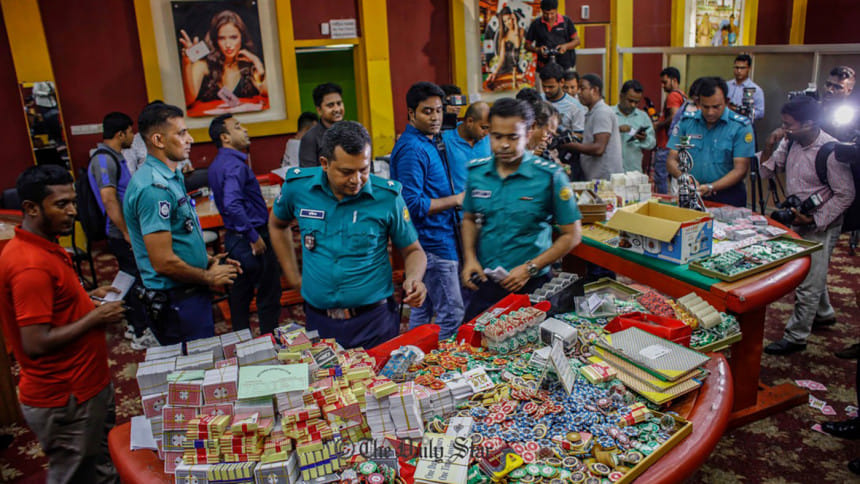Casino Bengal and a deep-seated malignancy

A Pandora's box has been opened and the cat is out of the bag. It beggars belief that as many as 60 casinos were operating in the city, some right under the nose of the police. And one such joint shared a common wall with a police station. But the public is expected to believe that the police, who are otherwise very alert and active when it comes to nabbing extremists, did not get wind of these illegal gambling dens till now.
The whole casino episode, organised and run by some office-bearers of the Jubo League, exposes some disconcerting pictures. It shows that corruption has become a malignancy eating into the very fabric of our society where breaking the law, not abiding by it, has become the norm. It also shows the decrepit moral standard of the ruling party's youth wing, and the close nexus between the culprits and some members of the law enforcing agencies. Above all, the image of the police force as a whole—which is expected to enforce rule of law and act against the lawbreakers belonging to the ruling party without a green signal from the right quarters—has been stained.
The degree of promptness of the police in discovering so many gambling establishments is really amazing. And that leaves us wondering whether these casinos had sprouted up overnight. Reportedly, the home ministry had instructed the police to take action against the casinos in 2017. And the gambling machines, as media reports have pointed out, were imported in 2015/2016. But nothing was done.
The cancer of corruption has pervaded the very fabric of our life in a manner that has the potential to destroy the nation from within. All major institutions of the state, from the public universities to public banks to other government agencies and departments, are vying to outdo one another in that respect. What impression will one get, for example, from the report that the University Grants Commission (UGC) has initiated an investigation into the alleged corruption of the vice-chancellors of 14 public universities? In two of these, students are agitating for the removal of the VCs. These corruption charges against the VCs have besmirched the reputation of not only our highest seats of learning, but also the teachers who work there.
As for the health of our banks, a report published in this newspaper on September 26 informs us that the actual quantity of bad loans is twice as large as what is acknowledged officially. The report also said that important and connected borrowers default "because they can." What it left unsaid, however, was that these habitual defaulters default because the rules are bent or reformulated to allow them to do so.
Equally affected by the cancer of corruption are the law enforcing agencies. We are not surprised by their prior inaction in the casino case, which was either out of ignorance—which is hard to believe—or because of their own complicity—which quite seems to be the case (given the circumstances surrounding the operations of the casinos). One wonders why the police had to wait for intelligence reports and instructions from the highest quarters before taking action. Is it not the duty of the police to act against illegal activities and nab the perpetrators without being prompted by any quarters?
We are told that the move against corruption is a cleansing operation. Like charity, purging the ills and the ill should also start from home, but it would be an incomplete exercise if this operation is not extended from the errant party cadres to all segments of the administration.
It was noticeable how quickly the Jubo League leaders distanced themselves from those who were arrested in the recent drive, the very people they were seen with in various programmes in the past. The denial mode is predictable, but the narrative that those arrested are all infiltrators is really a fig leaf that cannot hide the complicity of some responsible quarters or their dithering to act decisively against the wayward party apparatchiks. It does not help either when AL ministers say that corruption was institutionalised by the BNP government and that the BNP had started the casinos during their time. Ten years of being in power is too long a time for such justifications to wash with the public.
The Jubo League leaders caught in the illegal acts are not without their godfathers. And there are innumerable beneficiaries of the illegal earnings up and down the line, both in the administration and the party with an uninterrupted supply chain of illegal money. They are the ones that must be got hold of first if the current drive is to bear any fruit.
It is regrettable that the basic safety from the societal evil—which is the bounden duty of the politicians and the police to provide—has not been fully guaranteed to the people. It is said that a nation gets the leaders it deserves; but it may be worth remembering what Robert Kennedy once said about criminals and policemen: "Every society gets the criminals it deserves. What is equally true is that every community gets the law enforcement it insists on." We do not deserve the former and certainly wish to have the kind of law enforcement that can earn the respect of the people.
Brig Gen Shahedul Anam Khan, ndc, psc (retd) is Associate Editor, The Daily Star.

 For all latest news, follow The Daily Star's Google News channel.
For all latest news, follow The Daily Star's Google News channel. 



Comments